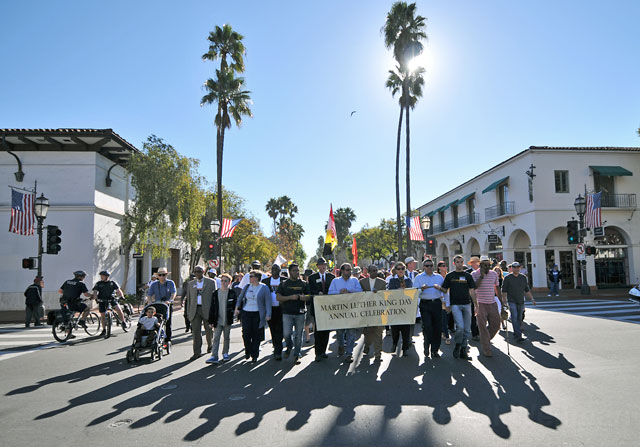From Nightmare to the Dream
Fielding Provost on Front Lines Against Segregation

It’s not uncommon for high school students, at some point, to forge their parents’ signatures. Most do it to get away with something. But Gloria Willingham, now an assistant provost with the Fielding Institute and the keynote speaker at this year’s ceremonial observation of Martin Luther King Jr. Day at the Arlington Theatre, did so to change the world. Willingham faked her parents’ names on a permission slip that enabled her to attend Little Rock Central High School—in Little Rock, Arkansas— in 1960. That was three years before Martin Luther King Jr. would deliver his now iconic “I have a dream” speech, and three years after nine black students—since dubbed the “Little Rock Nine”—first desegregated Central High School. For that to occur, however, President Dwight Eisenhower would have to call in the 101st Airborne to escort the students past the Arkansas National Guard deployed by then-governor Orval Faubus to keep the school all white. Faubus responded by closing all public schools rather than allow all of them to be integrated, but by 1960, federal judges had ordered Arkansas’s public schools re-opened. Once that happened, Willingham was in the first class of black students to attend Little Rock Central High School. Hers was the first class in which black students went all the way through. There were four blacks in Willingham’s graduating class.
While Willingham’s experience was not as harrowing as it was for the Little Rock Nine—no acid was thrown at her, no eggs tossed—it was plenty bad enough. Many teachers simply did not talk to her. When she entered the bathroom, the other girls would walk out. Extra-curricular activities were not an option, and through the course of a day, Willingham would endure no shortage of insults, taunts, and jeers. The worst part, she said, was going home at the end of day to find the mailbox filled with hate mail. She’d tear it up, she said, and kept it from her parents. “They never knew,” she said. She said she’s since discovered how other black students kept their parents in the dark. But that didn’t mean they didn’t feel the effects. Willingham said her father was fired from his job at a downtown department store when the local newspaper reported that she was one of the four to enroll at Little Rock Central. Though others in the black community expressed concern of the backlash school integration might generate, Willingham’s father never wavered. “He said, ‘We’ll do whatever we need to do,’” she recalled. “He stood by me.”
Though some white students proved nasty, others were not. Some ignored her or left her alone. But with others, budding friendships evolved. Willingham credits the presence of a French foreign exchange student attending the school with helping. “She didn’t know she wasn’t supposed to talk with us,” Willingham recalled. “That helped break some ice.” The school’s dean of students also made a point to give Willingham a big hug when she saw her, and one teacher, Mr. Zarlinga, announced that in his class, “Everybody is going to be treated equally.”
Willingham, always a bookworm and honor roll student, would go on to attend college, become a nurse, earn a PhD, and achieve considerable professional success in academia. But, as she told the crowd at the Arlington, she could never bring herself to set foot back inside her old high school. “I just couldn’t,” she said. But her daughter did attend Little Rock Central, where she had black teachers as well as white ones, and she was a cheerleader to boot. Not only that, one of the students who’d tormented Willingham as a peer, was her daughter’s teacher. “She’d treated me terribly,” Willingham said. “Just awful. But she said she felt regret all these years.” To make it up, this woman offered to drive Willingham’s daughter to school when Willingham could not.
At the time, Willingham said she never had second thoughts. “I figured if I could live through this, things would be different.” In many ways, she said, they clearly are. There’s a black man in the White House, after all; segregated education is not the law of the land. But many schools remain subject to de facto segregation and Little Rock itself, according to a study done several years ago by a Fielding graduate student, remains a society where blacks and whites live separate, parallel lives. “People my age and older, we’re kind of in the way,” she said. “We have too much baggage. But when I watch the children and see them play with each other, I see what changes have come and I think they’re really ready to make the dream come alive.”



